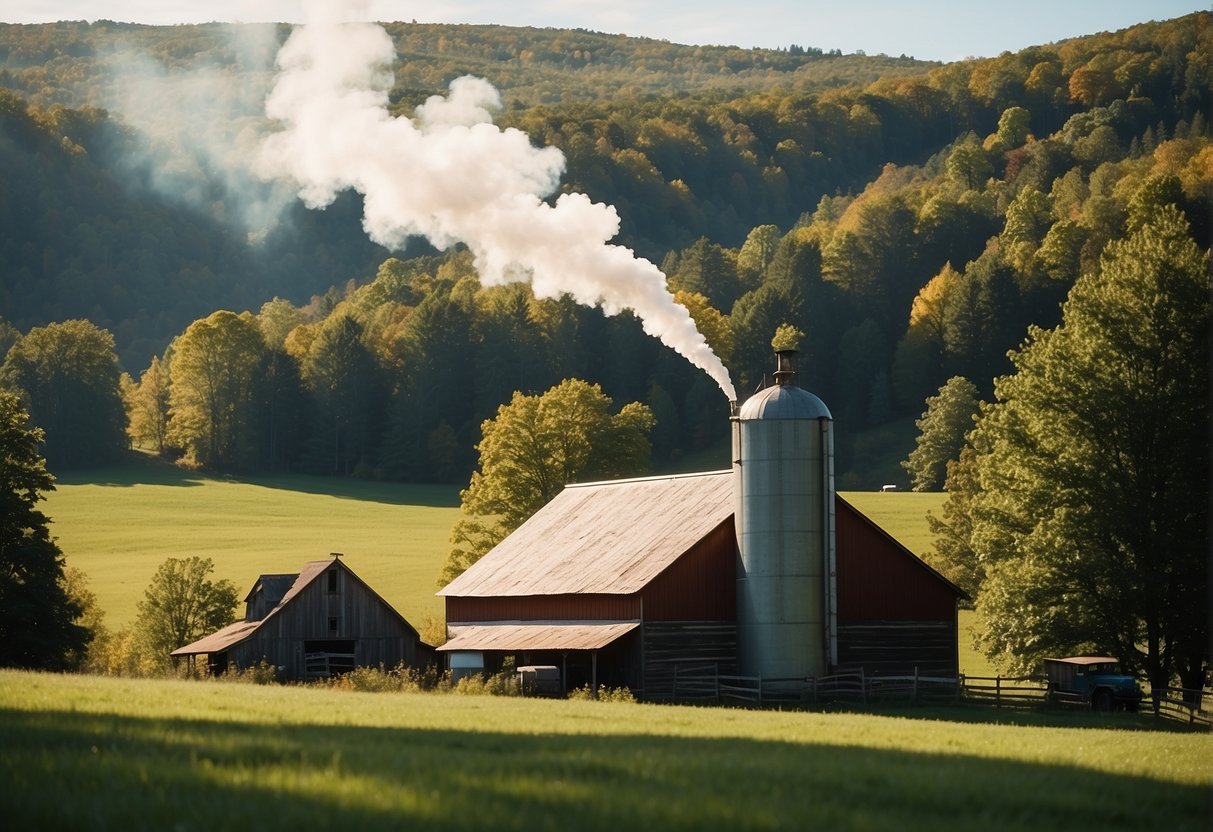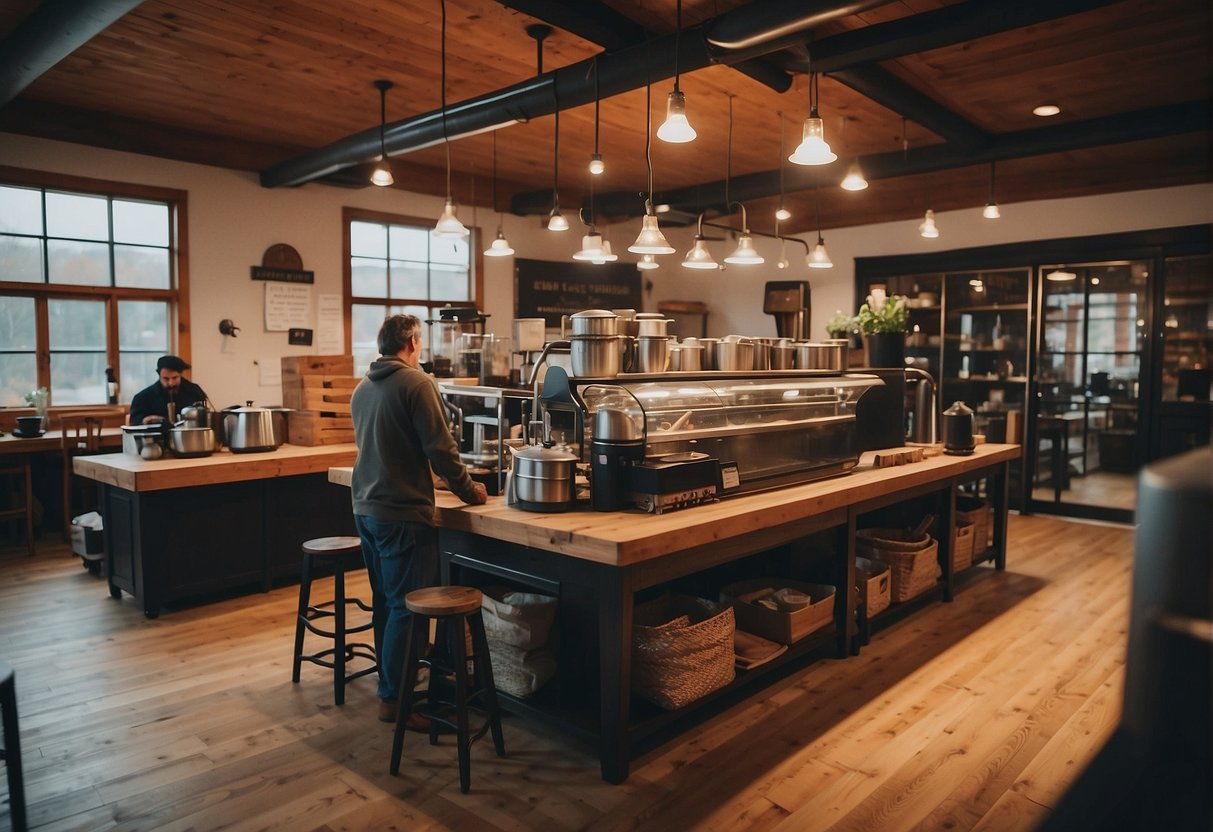Vermont, known for its scenic landscapes and artisanal products, has a thriving coffee scene that celebrates the craft of roasting. Local roasters take pride in transforming green coffee beans into the aromatic, flavorful beans that fill the cups of coffee aficionados across the state. The commitment to quality is paramount among Vermont coffee roasters, many of whom are involved in every step of the process, from sourcing ethically produced beans to expertly roasting them to perfection.

Coffee roasting in Vermont is characterized by small-batch processes that ensure attention to detail. Roasters such as Vermont Artisan Coffee & Tea Co., led by a passionate coffee expert, exemplify the state’s approach of hands-on craftsmanship and deep knowledge of coffee profiles. Each roastery tends to have its unique approach, with some focusing on single-origin coffees and others offering a diverse range of blends to cater to varying tastes.
Sustainability and ethical sourcing are also key tenets of Vermont’s coffee culture. Roasters like Big Jay Roasting Co. support local coffee farmers through programs like Fair Trade, ensuring that every cup serves not only the palate but also the global coffee community. The Green Mountain State’s roasters are not only committed to delivering high-quality coffee but are also dedicated to the principles of fair business practices and environmental stewardship.
History of Coffee Roasting in Vermont
https://www.youtube.com/watch?v=int0TYfzn2E&embed=true
Vermont has a deep-rooted history in the art of coffee roasting, which can be traced back to small, local businesses. These establishments have laid a foundation of rich coffee culture that values organic practices and fair trade principles. Today, Vermont boasts a number of roasters who prioritize sustainable and ethical sourcing of beans.
One notable roaster, the Vermont Coffee Company, commenced operations over thirty years ago. The company’s genesis was sparked by a passion for the coffee roasting process, setting a precedent for future local roasters. Learn more about their history here.
The state’s dedication to coffee extends beyond individual roasters, with its culture deeply ingrained in daily life. Cozy coffee shops and skilled baristas support these roasters, brewing beans that carry Vermont’s signature flavors. Vermonters’ attachment to coffee is detailed here.
Moreover, roasters such as Green Mountain Coffee Roasters have put Vermont on the map. Founded in 1981, the company’s journey from a small local roaster to a major player in the industry underscores Vermont’s coffee roasting legacy. Their rise also highlights an emphasis on sustainability and fair trade, aspects that resonate with Vermont’s spirit. Their prominence is elaborated here.
Across these developments, Vermont’s roasters continue to embrace and sometimes reinvent tradition. With a commitment to quality and ethics, they reflect a microcosm of the state’s broader values: integrity, community, and an unwavering dedication to craft.
Popular Vermont Coffee Roasters

Vermont’s coffee culture is rich and vibrant, with a particular emphasis on sustainability and artisanal techniques. Local roasters are renowned for their meticulous approach to crafting high-quality brews.
Burlington Coffee Scene
Burlington, the largest city in Vermont, is a hub for coffee aficionados with numerous roasters contributing to a dynamic coffee bar landscape. Muddy Waters stands out as a cozy, rustic coffee house, serving expertly brewed espresso drinks in the heart of the city. On the waterfront, Speeder & Earl’s showcases a dedication to the craft of coffee roasting, supplying local coffee shops with their aromatic blends.
Craft Roasters Across the State
Throughout Vermont, small-batch roasters excel in producing distinctive flavors. Green Mountain Coffee Roasters, established in 1981, has grown into one of the nation’s leading coffee companies, revered for its fair trade practices. While Vivid Coffee Roasters and Carrier Roasting are prime examples of craft roasters championing the rich coffee culture with their focus on organic, high-quality beans for their diverse roasts.
Roasting Processes and Techniques

In Vermont, coffee roasters pride themselves on their meticulous roasting processes and techniques that bring out the best in each batch of beans. These methods are crucial for ensuring the unique flavor profiles of specialty coffee.
Artisanal Roasting Methods
Artisanal roasting in Vermont is characterized by the hands-on approach roasters take to achieve the perfect roast. Each roaster uses traditional techniques that often involve small, carefully monitored batches, allowing for precise heat control and timing. Vermont roasters utilize their senses of sight, smell, and sound to determine the stages of roasting, ranging from the initial Maillard Reaction to the final development phase. This sensory-based approach ensures that each batch maintains its organic qualities and fresh taste.
Roasting Arabica Beans
When it comes to Arabica beans, Vermont roasters exhibit a deep passion for preserving the bean’s inherent quality. Arabica beans, known for their smooth, complex flavors, require a specific roasting technique to enhance their fine characteristics. Roasters typically roast these beans at a temperature starting around 150°C/302°F and concluding as temperatures increase, being vigilant not to over-roast and thus maintain the subtle nuances of the Arabica varietal. The final product is a testament to the roaster’s dedication to creating high-quality, fresh specialty coffee that resonates with coffee enthusiasts.
The Vermont Coffee Roasters ensure every step, from sorting to cooling, aligns with the elevated standards expected from a premium organic and Arabica-focused roastery.
Sustainable and Ethical Sourcing
Vermont coffee roasters are increasingly emphasizing sustainable and ethical sourcing practices. They often prioritize organic and fair trade certifications to demonstrate their commitment to both environmental stewardship and social responsibility. These certifications ensure consumers are purchasing products that adhere to rigorous standards of production and worker welfare.
For example, roasters focusing on craft coffee go to great lengths to build direct relationships with the producers, often working with small-scale farmers. They choose to import beans like Sidamo from Ethiopia, renowned for its unique flavors, and ensure that their sourcing practices benefit the local communities where these beans are grown.
Vermont Artisan Coffee & Tea, a notable example, procures a selection of its beans under fair trade terms, such as their fair trade Congo Umoja, which supports the Congolese Peace Movement. They embody a commitment to ethical sourcing by engaging directly with the farmers and visiting them periodically.
Another facet of Vermont’s roasters’ ethical approach is environmental consciousness. Roasters like Earthback Coffee Roasters have partnered with initiatives like the Rainforest Alliance to promote biodiversity and sustainable livelihoods, illustrating their eco-friendly practices.
Lastly, sourcing from regions like Papua New Guinea allows Vermont roasters to diversify their offerings while upholding ethical standards; they ensure their products contribute positively to the farming communities and create a minimal environmental footprint in the process.
Coffee Roasters and the Community
Coffee roasters in Vermont play an essential role in fostering local economies and providing coffee enthusiasts with high-quality options. They cater to individuals and businesses alike through their local shops and comprehensive wholesale and subscription services.
Local Coffee Shops
Vermont is home to a variety of local coffee shops that provide residents and visitors with a selection of premium and delicious coffee. For example, Vermont Artisan Coffee & Tea Co. not only roasts their own coffee but invites customers to visit their café for a truly local experience. They focus on crafting superb coffees and enhance the community vibe with educational experiences like coffee classes.
Wholesale and Subscriptions
For businesses and individual coffee lovers, roasters offer a range of wholesale and subscription services. Firms like Brio Coffeeworks offer an array of specialty coffee beans that are perfect for both wholesale clients and individual consumers. Moreover, companies such as Carrier Roasting Co. expand their impact by providing award-winning coffee to a nationwide audience. Subscription services have become increasingly popular, allowing customers to enjoy their favorite premium and even decaf options regularly. Carrier Roasting Co., for instance, boasts a coffee bar in the Old North End and has been applauded for its transparent relationships within the coffee supply chain.
These roasters support the local economy and cater to the diversity of coffee lovers by consistently providing access to high-quality, artisan coffee products.
Brewing and Enjoyment
In the world of specialty coffee, Vermont is recognized for its commitment to quality and the craft of coffee brewing. The sophistication of the brewing process and the intricate flavor profiles of the beans come together to define the coffee drinking experience.
The Perfect Espresso
Espresso, the backbone of drinks like lattes and cappuccinos, is an art form in Vermont’s coffee scene. Achieving the perfect espresso is a delicate balance of pressure and temperature, yielding a rich, premium shot with a balance of sweetness, often hinting at notes of caramel and chocolate. Here’s what to look for when assessing the quality of an espresso:
- Crema: A golden layer of foam on top indicative of freshness.
- Body: A syrupy feel that coats the tongue.
- Taste: A complex, pleasantly balanced bitterness.
Understanding Coffee Profiles
One cannot overlook the importance of understanding coffee profiles when brewing. Each roast carries unique characteristics that can range from light floral notes to deep, rich chocolatey undertones. Vermont roasters often share this flavor profile information to help coffee enthusiasts find their perfect match. Here are two key attributes:
- Acidity: The bright, crisp notes that give coffee its liveliness. It should be enjoyable, not overly sharp.
- Body: Describes the weight or thickness of the coffee on the palate. It contributes to the overall mouthfeel, whether silky, creamy, or full.
A freshly brewed cup from Vermont’s best roasters provides a delicious and authentic tasting experience, engaging the senses with the state’s fresh and locally sourced beans.
